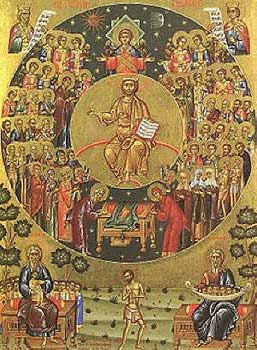
The Kaluga Icon of the Mother of God appeared in 1748 in the village of Tinkova, near Kaluga, at the home of the landowner Basil Kondratevich Khitrov. Two servants of Khitrov were cleaning out junk from the attic of his home. One of them, Eudokia, noted for her temper, was given to rough and even indecorous language. Her companion was modest and serious.
They discovered a large package covered in a linen cloth. Undoing it, the girl saw the picture of a woman in dark garments with a book in her hands. Considering it to be the portrait of a woman monastic and wanting to bring Eudokia to her senses, she accused her of being disrespectful to the abbess.
Eudokia jeered at the scolding words of her companion, and becoming increasingly angry, she spit on the picture. Immediately, she became convulsed and fell down senseless. She also became blind and mute. Her frightened companion reported what had happened to the household.
The next night, the Queen of Heaven appeared to Eudokia's parents and told them that their daughter had behaved impertinently toward Her and She ordered them to serve a Molieben before the insulted icon, then sprinkle the invalid with holy water at the Molieben.
After the Molieben Eudokia recovered, and Khitrov took the wonderworking icon into his own home, where it granted healing to those approaching it with faith. Later, the icon was placed in the parish temple of the Nativity of the Most Holy Theotokos in the village of Kaluga. At the present time it is located in the cathedral church of Kaluga.
Through this icon the Mother of God has repeatedly manifest Her protection of the Russian land during difficult times. The celebration of the Kaluga Icon on September 2 was established in remembrance of the deliverance from a plague in 1771. A second celebration was established October 12, in memory of the preservation of Kaluga from the French invasion of 1812. In 1898, a celebration was established on July 18 in gratitude to the Mother of God for protection against cholera. The icon is also commemorated on the first Sunday of the Apostles' Fast.
Back

 The Kaluga Icon of the Mother of God appeared in 1748 in the village of Tinkova, near Kaluga, at the home of the landowner Basil Kondratevich Khitrov. Two servants of Khitrov were cleaning out junk from the attic of his home. One of them, Eudokia, noted for her temper, was given to rough and even indecorous language. Her companion was modest and serious.
The Kaluga Icon of the Mother of God appeared in 1748 in the village of Tinkova, near Kaluga, at the home of the landowner Basil Kondratevich Khitrov. Two servants of Khitrov were cleaning out junk from the attic of his home. One of them, Eudokia, noted for her temper, was given to rough and even indecorous language. Her companion was modest and serious.